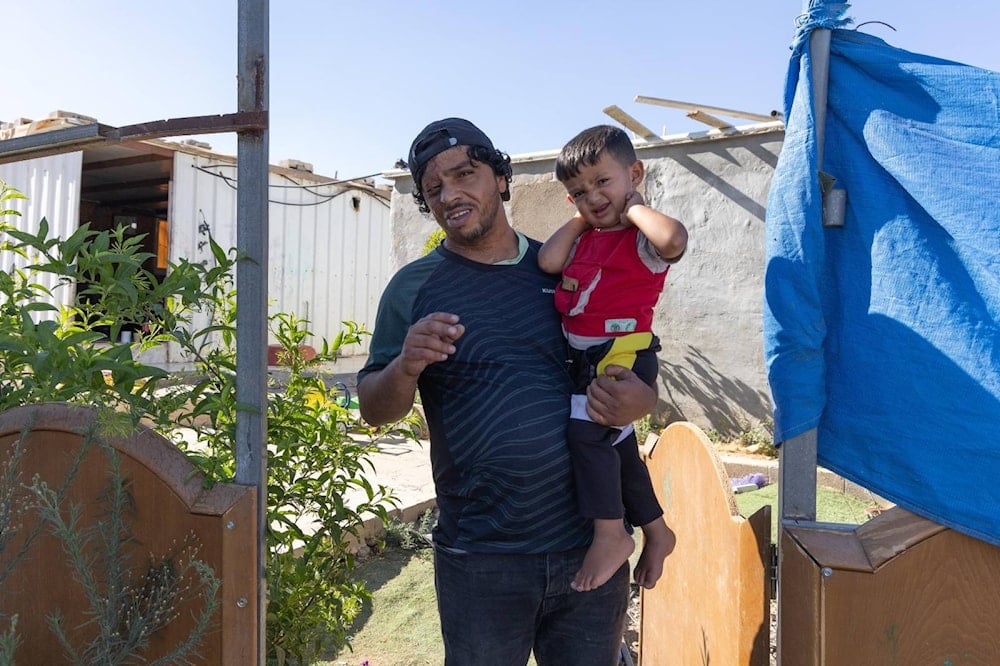No Other Land foretold tragedy as its hero was silenced by settler
Awdah Hathaleen, a Palestinian activist and teacher whose defiant voice anchored the Oscar-winning No Other Land, was shot dead by an Israeli settler.
-

An undated photo of marytr Awdah Hathaleen, a Palestinian activist and co-star of the Oscar-winning documentary No Other Land (X)
Awdah Hathaleen, a Palestinian activist and co-star of the Oscar-winning documentary No Other Land, was shot dead Monday evening near the village of Umm al-Khair in the occupied West Bank. The film, which exposed systemic settler violence and the erasure of Palestinian life, has now become a haunting prophecy, with one of its central voices silenced by the very forces it sought to expose.
The settler in this video shot and killed Awdah Hathaleen today in the West Bank village of Umm al Khair. I last saw Awdah in November. He was a teacher and an activist who struggled courageously for his people. He should have lived a lot longer. pic.twitter.com/AuKurnZCqy
— Ben Ehrenreich (@BenEhrenreich) July 28, 2025
Hathaleen, 31, was killed during a violent settler incursion near the settlement of Carmel, in the South Hebron Hills. The assault began after a group of settlers, backed by heavy machinery, attacked Palestinian land. According to eyewitnesses and video evidence, Yinon Levi, an extremist settler previously sanctioned by the US administration and still blacklisted by Canada, the UK, and the EU, opened fire with a handgun. Hathaleen was shot in the upper body and later died in Soroka Medical Center.
Israeli settlers have murdered our beloved hero, Awdah Hathaleen, from the Um Al-Khair community in Masafer Yatta.
— Issa Amro عيسى عمرو 🇵🇸 (@Issaamro) July 28, 2025
Awdah stood with dignity and courage against oppression.
His loss is a deep wound to our hearts and our struggle for justice.
May he rest in peace.
We will never… pic.twitter.com/mLQiPeDMzd
Israeli occupation forces arrived at the scene only after the deadly violence had unfolded, and instead of protecting the victims or immediately apprehending the settler who opened fire, they detained four Palestinians and two foreign activists. The shooter, Yinon Levi, was arrested later, highlighting the grim reality that under military occupation, justice is never served to the oppressed.
Wider context
In an outrageous provocation, settlers from the Carmel outpost released a statement defending the killing, making no mention of Hathaleen and instead calling for the “removal” of Palestinian structures in the area.
Footage from the incident shows Levi firing his weapon into the air while a bulldozer looms in the background, an image that echoes No Other Land’s central themes of displacement, land theft, and armed impunity. Haaretz reported that the bulldozer had entered Palestinian-owned land, contradicting settler claims that the construction was legal. Palestinians were seen defending their land and attempting to block the machinery's advance.
Condemnations poured in, with Israeli Labor MK Gilad Kariv directly blaming the far-right Israeli government for fueling settler violence. “Ben Gvir has paralyzed the police, Katz has blocked Shin Bet, and the army continues to turn a blind eye,” Kariv said, warning that this violence “will not stop at the Green Line.”
Human rights group Peace Now emphasized that settler terrorism, often emerging from unauthorized outposts, threatens not only Palestinian communities but also the last remnants of what it described as "the Israeli legal system’s credibility."
“A state that values life must arrest its violent citizens who take the law into their own hands,” the group said.
Earlier this year, in March, occupation forces intensified their raids in Qalqilya, Tulkarm, and Jenin. During that crackdown, they killed a recently released Palestinian prisoner and abducted Basel Adra, another central figure in No Other Land, whose journalism has documented settler attacks and home demolitions in al-Khalil.
Not an isolated incident
This killing is not an isolated incident but part of a wider campaign of violence across the West Bank, as Israeli forces escalate operations in tandem with settler gangs.
The Palestinian Health Ministry announced on Monday evening that a young man, Muhammad Al-Jamal, was killed by Israeli occupation forces' gunfire at the northern entrance to al-Khalil, in the Ras al-Jura area. Al-Jamal's body was withheld by the Israeli forces.
On July 25, Israeli forces and settlers intensified their assaults on Palestinians in the West Bank on Friday, with attacks targeting civilians and property, killing two Palestinians.
The Palestinian General Civil Affairs Authority reported that Palestinian youth Wadee Mohammad Othman Samara was killed by Israeli occupation forces near Adh-Dhahiriya, west of al-Khalil, who then withheld his body.
Similarly, an unidentified person was killed in Fajjar in the Beit Lahm governorate, and his body was also withheld by the IOF.
According to documentation by the Palestinian Information Center, at least 1,051 Palestinians have been killed in the West Bank since "Israel's" war on Gaza began on October 7, 2023.
Now, as global audiences recall his voice through the lens of No Other Land, his killing underscores the genocidal logic of settler-colonial violence and the urgent need for global accountability.
'Israel' votes on legalizing the occupation
On July 23, the Israeli parliament passed a controversial bill claiming Israeli "sovereignty" over the West Bank and Jordan Valley, with the legislation receiving majority support from Knesset members.
The vote passed with 71 members supporting the measure and 13 opposing it, demonstrating the cohesion within the right-wing ruling coalition while also securing unexpected support from the opposition Yisrael Beiteinu party.
While the resolution itself holds no binding legal authority, its passage before a three-month legislative break reflects increasing political traction for "annexation policies". It follows the Knesset's 2024 rejection of Palestinian statehood and aligns with Finance Minister Bezalel Smotrich's persistent efforts to formalize Israeli authority throughout the West Bank.

 5 Min Read
5 Min Read










